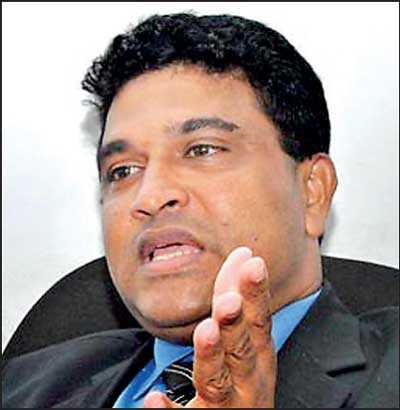Saturday Feb 21, 2026
Saturday Feb 21, 2026
Wednesday, 20 March 2019 00:00 - - {{hitsCtrl.values.hits}}
By Chathuri Dissanayake
Emboldened by a $ 3.85 billion investment for an oil refinery in Hambantota, the Board of investment (BOI) is confident of meeting this year’s targets, focusing on manufacturing and service sector investments to give the country’s economy a much-needed boost.
 |
Deputy Minister of Development Strategies and International Trade Nalin Bandara |
 |
BOI Director General Champika Malalgoda |
“I am sure we can meet our investment target for the year with all the investments in the pipeline,” BOI Director General Champika Malalgoda told reporters.
Attracting only $ 2.3 billion worth of investments last year, BOI fell short of meeting the $2.5 billion target in 2018, out of which 52% came from projects approved before 2015, and 48% from projects coming in after 2015.
However, it is still a 38% increase from the $ 1.78 billion record in 2017, the highest recorded in the country in one year, according to Malalgoda.
The country has received $17 billion investments since the inception of BOI in 1978, out of which $ 5.8 billion were brought in after 2015.
She is confident of attracting investments to set up manufacturing plants, moving away from the infrastructure-based investments the country has received so far.
“We are now targeting to attract investments to boost production in the country, we already have set up the infrastructure needed. In previous years that’s where the investments came in, for buildings and roads,” she said.
The $ 3.85 billion investment for the oil refinery, the first investment for the year, is set to commence construction of its tank farm on 24 March.
The refinery, with a capacity of producing 200,000 barrels a day, is a joint venture between Singapore-based company Silverpark International Ltd., which holds a 70% stake, and Oil and Gas Company of the Sultanate of Oman, which will hold 30%, Development Strategies and International Trade Ministry Technical Advisor Mangala Yapa said.
According to Deputy Minister of Development Strategies and International Trade Nalin Bandara Jayamaha, the new refinery will have five times the capacity of the current oil refinery managed by Ceylon Petroleum Cooperation. Although the production isn’t targeting export market, local buyers will also be able to buy products at competitive prices, he said.
However, there are no commitment from Sri Lanka to buy any products, Yapa insisted.
The construction, which is expected to finish by in 48 months, will first focus on the tank farm. The first phrase of investment will bring in $ 1.8 billion, Yapa said.
Once completed, the venture is expected to bring in $ 7 billion export revenue, while helping generate traffic to Hambantota Port.
The investments have been promised a land area of 585 acres in total: 200 acres will be given from Mirijjawila Industrial Zone, while another 385 acres of land belonging to the Mahaweli Authority will be released to the project.
“This will offset the argument that Hambantota Port is owned and operated as China pleases,” Bandara said, noting that the Singapore FTA also becomes a reality with the new investment.
The venture is expected to generate 1500 jobs once operation starts, while generating 750 jobs during the project period.
Construction of another cement factory with $ 75 million investment will also commence this month. The factory will boast a production capacity of 3.6 metric tonnes.
The investment, which will also produce pre-fab concrete is also expected to create 1000 jobs, the Minister said, adding that the skills development and vocational training needed for employment in the plants will commence parallel to the construction.
“This is our next challenge, and we are looking at requirement-specific trainings,” Bandara said.